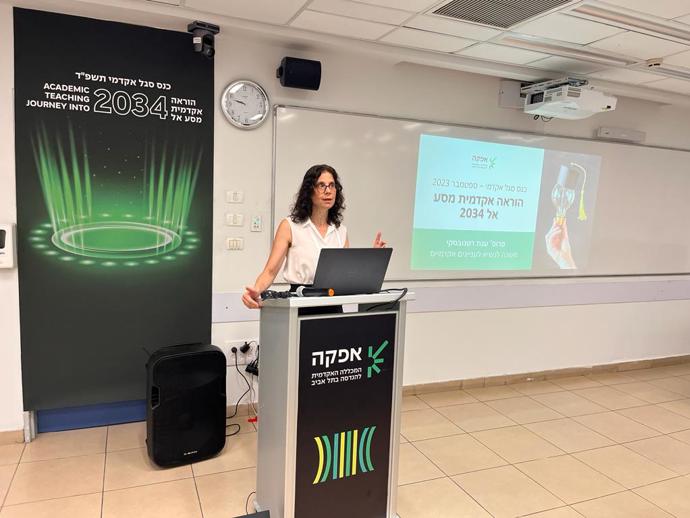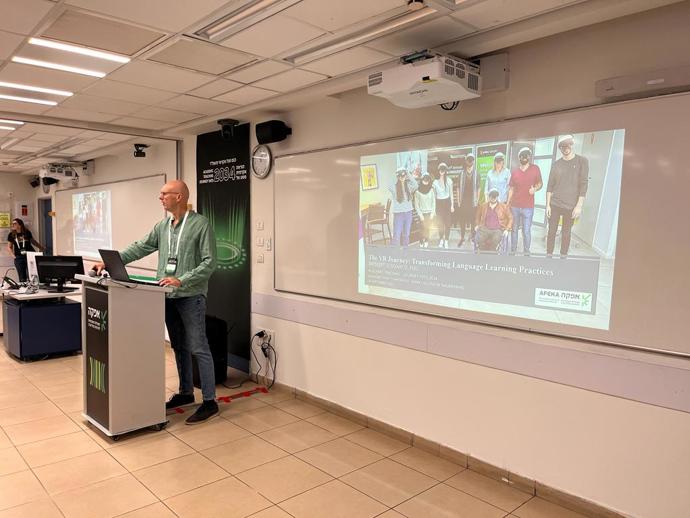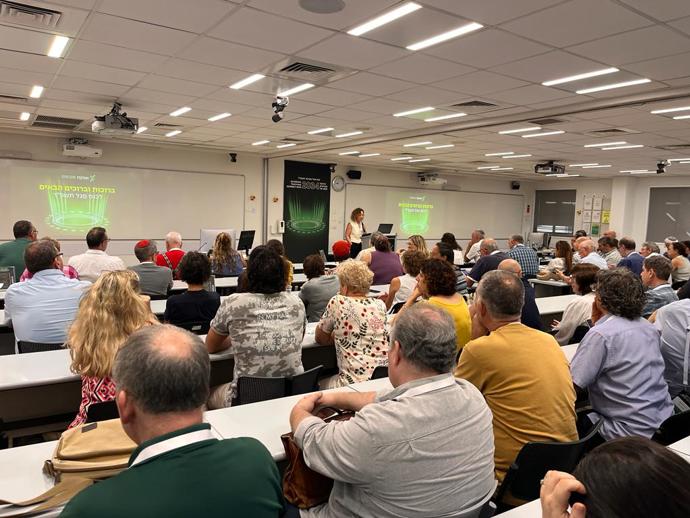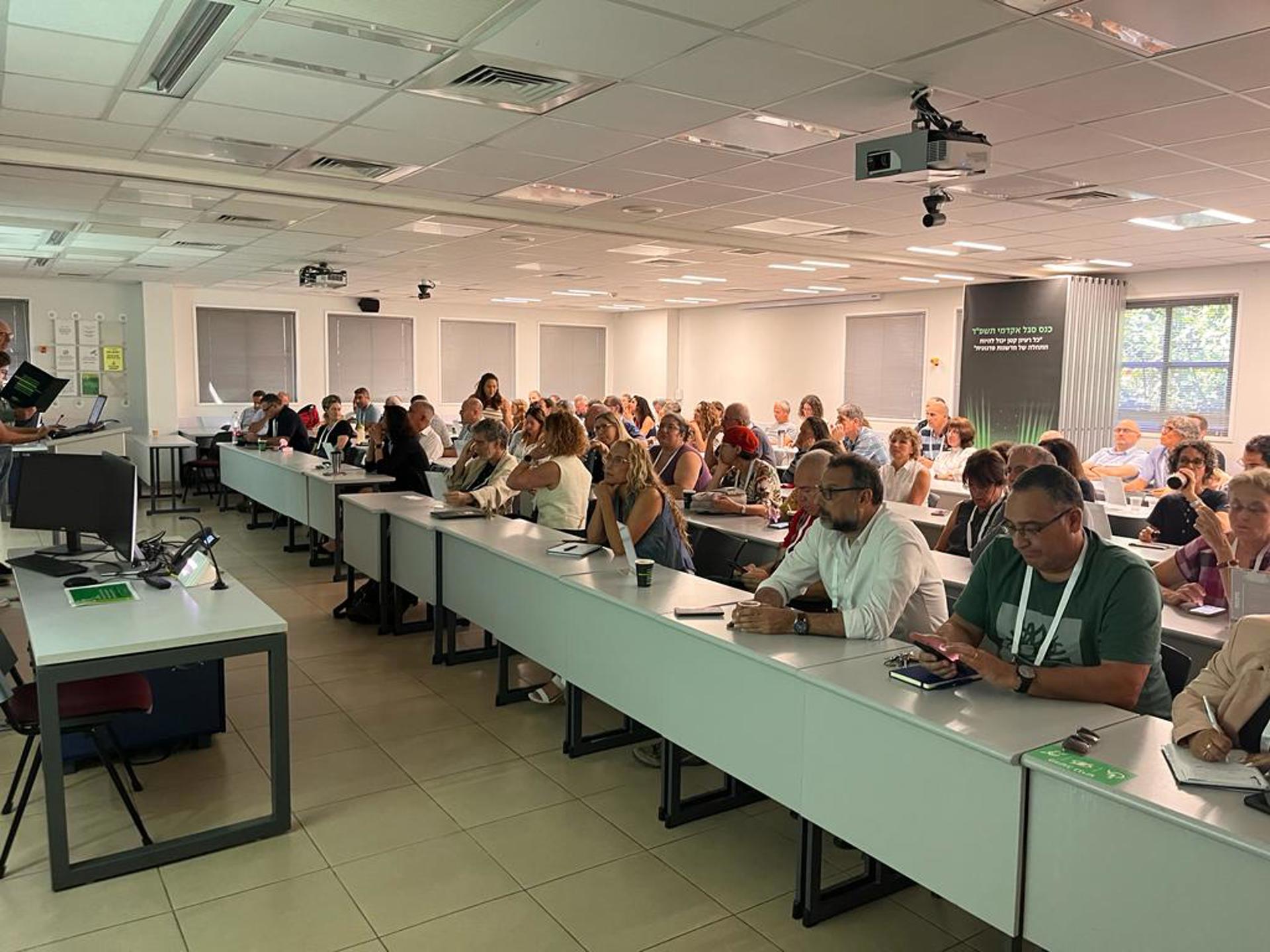


Journey to 2034
In September 2023, Afeka held its fifth academic faculty conference. This conference, organized by the Center for the Promotion of Teaching in preparation for the ’23-’24 academic year, was held under the banner of “Academic teaching – The journey to 2034”.
Afeka College is dedicated to being a leading institution for educating engineers – in terms of both professional knowledge and personal skills. Thus, its academic programs are adapted to the ever-evolving world of technology and continuously updated to ensure that Afeka students receive the most relevant tools as they enter the job market. The Center for the Promotion of Teaching assists the academic faculty, exposing them through workshops and personal mentoring to the Center for the Promotion of Teaching varied tools and methods of innovative pedagogy that enable to teach engineering and science alumni the required skills.
Afeka’s vice president of academic affairs Prof. Anat Ratnovski opened the ’23-’24 conference with a review of the faculty’s diverse academic activities in the previous year, and a look at the many challenges expected in years to come. Afterwards, Dr. Yuval Dror, a sociologist of technology, media personality, and leading commentator on the study of the business, social, moral, and cultural implications of the AI revolution, presented a fascinating talk titled “How to be a person in the age of AI?”
The conference continued with three fascinating TED talk sessions presented by faculty members who described the pedagogic processes and changes they had spearheaded in their various courses. The talks were designed, as ever, to promote knowledge exchange and the building of a learning community.
Mr. Dan Herman moderated the conference’s first session, on “Call-for-submissions stories and aspects of pedagogic innovation”. Dan, head of the automotive specialization at Afeka’s school of mechanical engineering, said at the beginning of the session: “Small ideas grow as they go, inviting the ‘borrowing of ideas’ from colleagues – which is what’s so special about it. What we try to do each year is to create a time and place for us all to hear and speak, to adopt ideas and transform them into new ones. Pedagogic innovation arises from a diversity of viewpoints and opportunities: from annual calls for submissions to the academic faculty, to watercooler chats in the college’s hallways, formal/informal meetings, conferences, and more.”
Dr. Brigitta Schvarcz, head of the English study unit, opened the session with a brief talk on how virtual reality can be incorporated in English courses and how it helps Afeka students to prepare for job interviews. Additionally, Brigitta presented findings from her study on student attitudes to the use of VR for learning.
Dr. Efrat Bank of the mathematics unit gave a talk on the “Discrete Mathematics” course, held this year for the first time at Afeka using active learning through the IBL method. Moderator Dan Herman concluded the session by describing changes to the automotive specialty’s curriculum and its adaptation to the present and future automotive industry vis-à-vis the ACES revolution: the advent of autonomous, connected, electric, shared vehicles.
The second session focused on the “Skill teaching and evaluation” course given to some of the faculty members to provide them with tools for teaching and evaluating personal proficiencies, distilling concepts, understanding their essence, and applying them in their courses. The session was presented by four faculty members who had taken the course: Dr. Yossi Luzon of the school of industrial engineering and management spoke about critical analysis in writing, Dr. Nadav Shefer of the school of medical engineering spoke about the challenges of lecturing to large groups, and Dr. Alona Mokhov of the mathematics unit spoke about summoning up skills when learning math. The session was concluded by session moderator Dr. Benny Abramov of the school of electrical engineering, who described how he had converted his course “Advanced hardware design lab” into a PBL course.
Dr. Ayelet Shvalb of the school of mechanical engineering moderated the third session, “Snapshots of pedagogic guidance processes” – which dealt with the frequent tension between the desire to act independently towards goals based on personal values and beliefs and the obligation to follow social and communal rules and values. This tension is especially apparent in the work of a lecturer, who – in order to resolve the tension – must rely on a learning community of professionals who jointly discuss knowledge and practices in order to grow professionally. The session presented pedagogic guidance processes undergone by faculty lecturers as part of a learning professional community.
Mr. Pavel Shmatnik of the school of industrial engineering and management shared a key question with the audience: What is more important in a course – the final product or the learning process? This while addressing a graduate course that he teaches.
Ms. Iris Nagar of the mathematics unit shared with the audience a process that has made her instinctive teaching conscious and made the covert overt. Ms. Irena Libster of the school of electrical engineering spoke about her way of turning a lesson interactive using questions as a tool of interaction and connection.
Dr. Ayelet Shvalb concluded the session by discussing the two key elements of any good course: the lecturer and the students – and how to reconcile between the content a lecturer wishes to present and the tools the students wish to acquire.
At the end of the conference, Afeka president Prof. Ami Moyal addressed the college’s faculty of lecturers: “As an academic institution we’ve reached an important milestone – we’ve instituted an organizational culture of critical thinking. Going forward, it is our duty as an institution to provide the tools that will enable every person to dare and realize their professional dreams in all fields of endeavor, meanwhile knowing that we are on a never-ending journey of change.”
Dr. Irma Jan, director of Afeka’s Center for the Promotion of Teaching: “The conference took Afeka’s academic faculty on a real journey into future pedagogy. The lecturers led the conference themselves, and did so truthfully and sincerely, even in the face of complex issues. The participants and the various topics of discussion throughout this day have opened a door to different pedagogic thinking and processes. The fact that the conference raised more questions than it answered is marvelous – this is academia at its best. We look forward to the near and distant future, and to academia’s role within it.”



Journey to 2034
Share a link using:
https://www.afeka.ac.il/en/afeka-news/magazine/journey-to-2034/WhatsApp
Facebook
Twitter
Email
https://www.afeka.ac.il/en/afeka-news/magazine/journey-to-2034/